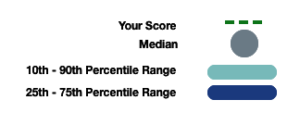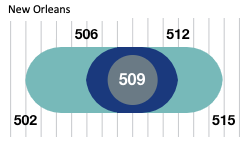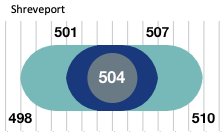The Medical College Admission Test (MCAT) is a standardized, multiple-choice examination designed to assess problem solving, critical thinking, and writing skills in addition to the examinee’s knowledge of science concepts and principles prerequisite to the study of medicine.
Scores are reported in each of the following areas:
- Chemical and Physical Foundations of Biological Systems
- Critical Analysis and Reasoning Skills
- Biological and Biochemical Foundations of Living Systems
- Psychological, Social, and Biological Foundations of Behavior
Medical college admission committees consider MCAT scores as part of their admission decision process.
For reference, here are the score breakdowns for the LSU New Orleans and Shreveport 2020 entering class.
What Do I Need to Know for the New MCAT?
Since 2015, the MCAT changes from the current version in six major ways:
- The New MCAT Has More Tested Topics:
There will be three additional semesters’ worth of material in college-level biochemistry, introductory psychology and introductory sociology, increasing the number of prerequisite classes from eight to eleven. Passages will also place more emphasis on integrating topics, with general chemistry, physics, and biochemistry (for instance) all appearing within the same passage! Here’s the new MCAT at a glance: - The New MCAT Is Almost Double The Length:
On the new MCAT, you’ll face 230 questions over 6 hours and 15 minutes versus 144 questions in 3 hours 20 minutes currently. The new test will require a lot more stamina and focus. The breakdown of these questions is 10 passages with 4 to 7 questions each and 15 stand-alone questions in each of the science sections, and 9 passages in the CARS section. (Information from AAMC Quarterly Update Meeting, May 2014) - The New MCAT Will Have a Different Scoring Scale:
Each of the four sections on MCAT 2015 will be scored 118-132, for a total possible score of 528. The mean is expected to be 125 per section for a total mean score of 500. This differs from the current 1-15 per section and 1-45 total scale. The first administration of the new MCAT will be in April 2015. - You’ll Face New Question Types & Skills:
The current MCAT focuses on content knowledge and critical thinking, but the new MCAT tests two additional skills. Research Design focuses on the fundamentals of creating research projects, bias, faulty results, and variable relationships. Graphical Analysis & Data Interpretation focuses on deriving conclusions and drawing inferences from visual data, including figures, graphs and data tables. - The New MCAT Has A More Medical Approach:
On the new MCAT, passages will be restructured to test all of the natural sciences within biological systems, often invoking physiology or pathology. Showing the application of all the tested sciences to medicine encourages students to view these subjects not simply as prerequisites for med school, but for the practice of medicine in general. - Verbal Reasoning Is Changing Slightly:
The new section will now be called Critical Analysis and Reasoning Skills, or CARS. Unlike the current Verbal Reasoning section, the new CARS section will no longer include passages on the natural sciences; instead, it will focus exclusively on humanities and social sciences passages. This section will now have 53 items, which will need to be completed in 90 minutes. The passages will have 500 – 600 words. - Test Dates and Administration
(Reference)



